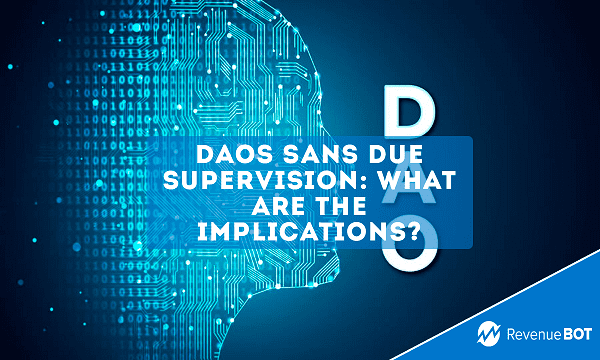
Decentralized autonomous organizations (DAOs) seem to gain traction both in the crypto space and the blockchain world. What’s more, DAOs are self-managed entities that operate using smart contracts in a blockchain. While DAOs may potentially revolutionize the way companies operate, they also pose a risk if there is a lack of proper oversight.
What is DAO?
A DAO is basically one of the types of organizations that operate using blockchain. Blockchain in turn stands for a decentralized digital ledger that records transactions in a transparent and immutable way, implying that once a transaction is logged on the blockchain, it cannot be altered or deleted.
DAOs rely on a set of rules and protocols encoded in self-executing smart contracts that ensure automated rule compliance. These smart contracts are deployed on the blockchain, where they remain publicly visible and verifiable by anyone who has access to the network.

Unlike traditional organizations, those managed by a board of directors or a centralized authority, DAOs are run by their members. One can become a DAO member by purchasing tokens which constitute ownership and voting rights in the organization. Every member of a DAO has a say in the decision-making process, which is carried out through a process of decentralized governance.
One of the key strengths of DAOs is that they operate without any intermediaries, be they banks or lawyers. Transactions and decisions are automated through the use of smart contracts, thus reducing the risk of human error or bias. Doing so also makes DAOs very transparent, as all transactions and decisions are recorded on the blockchain for anyone to see.
Moreover, DAOs tend to be used for crowdfunding purposes since participants have the opportunity to invest in the organization and receive a share of the profits generated by that very DAO. Likewise, these entities qualify for decentralized applications (dApps) in the form of prediction markets or social networking platforms that allow participants to contribute to the development and management of the application.
So what might happen if the DAO is not adequately monitored?
By and large, DAOs introduce a new paradigm in organizational management and are capable to disrupt traditional business models. They offer a higher level of transparency as well as the option of working with no middlemen. However, they also pose such unique challenges as the necessity of proper guidance and oversight to ensure their safe and sustainable operation. To learn more about the consequences of inadequate DAO oversight, read on.

- Lack of accountability. Among the major outcomes of operating a DAO without proper oversight is a lack of accountability. Being autonomous, DAOs have no central authority responsible for their actions. If DAO members engage in unethical or illegal activities, they might lack the ability to hold people accountable.
- Fraud risk. Another potential casualty is the risk of fraud. As we mentioned earlier, DAOs operate using smart contracts in a way that is automated and you can’t change them once you’ve deployed them. If smart contracts either suffer from vulnerabilities or are poorly designed, attackers can exploit them and steal funds from the DAO.
- Insecurity. DAOs are prone to hacks and other security breaches. Without proper surveillance, a DAO may fail to have sufficient safety measures in place to protect the assets of its members. This can result in losses and financial instability.
- Regulatory oversight. When it comes to DAOs and their potential impact on the financial industry, many regulators worldwide may want to pay a closer look. Should a DAO operate without due care, it may attract undesirable government scrutiny. This can cause legal challenges and penalties, which might be detrimental to both the organization and its members.
- No transparency. DAOs may lack transparency as well. Transparency is vital so that DAO members and stakeholders can monitor its activities, detect any issues or threats, or make sound decisions about any investments. Failure to be transparent means mistrust and uncertainty, which can damage the DAO’s reputation and financial sustainability.
- No versatility. As previously stated, DAOs are operated by smart contracts developed to ensure adherence to a specific set of rules and protocols. Even though this may offer clarity and transparency, it may also limit the versatility of the institution. DAO can fail to adapt to evolving nature of circumstances or respond to emerging risks or opportunities unless it is properly supervised.
Conclusion
DAOs hold the promise of groundbreaking improvements in the way organizations operate, yet they present a certain degree of risk. Lack of accountability, fraud risk, poor security, and regulatory oversight of DAOs are just some of the possible implications. What is critical for DAOs is to have governance structures so they can ensure transparency and accountability of their activities. DAOs that prioritize governance and supervision stand a better chance of success and prosperity in the long run.
